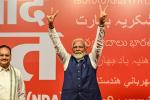Indian Prime Minister Narendra Modi looked set on Tuesday to retain power at the head of a ruling coalition, but his Hindu nationalist party lost its outright majority for the first time in a decade as voters defied predictions of another landslide.
The outcome unnerved investors, with Indian stocks falling steeply as emerging results showed that Modi would, for the first time since sweeping to power in 2014, depend on at least three disparate regional parties whose political loyalties have wavered over the years.
This, analysts say, could introduce some uncertainty into policymaking in the world's most populous democracy after a decade in which Modi has ruled with a strong hand.
Exchange-traded funds tracking India’s stock market fell amid the political shift. iShares MSCI India ETF is on pace for the largest percent decrease since Dec. 13, 2021, when it fell 7.71%, as tracked by Dow Jones Market Data Group.
The iShares MSCI India Small Cap ETF and the iShares India 50 ETF also traded sharply lower.
ETFs allow for easy access to Indian markets for foreign investors compared with direct investments into equities in India, where it takes nine months for a foreign investor to open up local accounts, said Malcolm Dorson, head of emerging markets strategy at ETF provider Global X, back in January.
WARREN BUFFETT'S FAVORITE ETFS
Modi's Bharatiya Janata Party (BJP) won a majority on its own in 2014, ending India's era of unstable coalition governments, and repeated the feat in 2019.
Modi said people had placed their faith in the BJP-led coalition for a third time, and it was historic, in his first comments since counting of votes began.
"The blessings of the people for the third time after 10 years boosts our morale, gives new strength," Modi told cheering BJP members at party headquarters in New Delhi.
"Our opponents, despite being united, could not even win as many seats as BJP won."
Promising to work harder and take "big decisions," Modi listed electronics, semiconductors and defense manufacturing, renewables and the farm sectors as areas of special focus in his third term, without elaborating.
BIDEN CONFUSES XI WITH PUTIN WHILE DEFENDING NEW TARIFFS
Investors had cheered the prospects of another Modi term, expecting it to deliver further years of strong economic growth and pro-business reforms, but the margin of victory emerged as a worry during the counting.
Neelesh Surana, chief investment officer at Mirae Asset Mutual Fund, said the market had over-reacted amid a sense of disbelief. "However, despite the verdict, there will likely be underlying continuity in government policies," he said.
Modi, 73, who first swept to power in 2014 by promising growth and change, was seeking to be only the second prime minister after India's independence leader Jawaharlal Nehru to win three straight terms.
Reuters' YP Rajesh, Krishn Kaushik and Nikunj Ohri contributed to this report.
